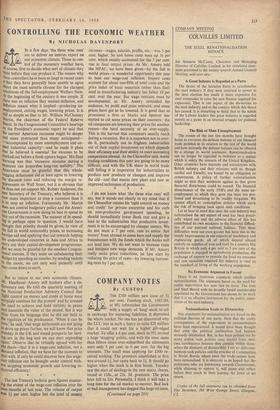CONTROLLING THE ECONOMIC WEATHER
By NICHOLAS DAVENPORT
IN a few days 'the three wise men' are to deliver an interim report on our economic climate. Those in con- trol of the monetary weather have, Of course, first to decide what sort of climate they Want before they can produce it. The reason why these controllers have been so inept in recent years 15 that they have generally been unable to agree about the most suitable climate for the changed Conditions of the full-employment Welfare State. At the beginning of the century it was simple. If there was an inflation they wanted deflation, and deflation meant what it implied—producing un- employment, cutting wages, lowering prices. It is still as simple as that to Mr. William McChesney Martin, the chairman of the Federal Rekerve Board. In the Congressional Committee's hearings tin the President's economic report he said that the current American recession might be deeper and more protracted than many anticipated— "-'accompanied by more unemployment and un- used industrial capacity'—and he made it plain that he believed it essential 'for excesses to be Worked out before a fresh upturn began.' His final Warning was that 'excessive stimulus during a recession can jeopardise long-run stability.' The Americans must be grateful that this whole- hogging deflationist did at least agree to lowering the discount rates and reducing the margin re- quirements on Wall Street, but it is obvious that he does not yet support Mr. Robert Anderson, the tiew Secretary of the Treasury, who believes it is now more important to stop a recession than it is to stop an inflation. Fortunately Mr. Martin does not control budgetary policy and the Ameri- ena Government is now doing its best to spend its Way out of the recession. The manner of its spend- ing is perhaps open to question. I would have thought that priority should be given, in view of ,the fall in world commodity prices, to increasing Foreign aid and applying that aid towards helping the undeveloped countries in Asia and Africa to arry out their capital-development programmes. But we must be grateful for the smallest Congres- iional mercies. If they insist on unbalancing their Budget by spending on missiles, by sending rockets 0 the moon, we can only wait patiently until hey come down to earth.
But to return to our own economic climate. Mr. Heathcoat Amory still hankers after a de- lationary one. He told the quarterly meeting of he National Production Advisory Council that tight control on money and credit at home must ertainly continue for the present' and he stressed he 'need to achieve and hold stability in prices Ind maintain the value of the pound. But it was lear from his language that he did not hold to he rigidities of his predecessor. 'When it can be seen,' he said, `that wage settlements are not going 0 drive up prices farther, we will know that price ;lability in the UK and sound prospects, for sterl- ng are in the bag and we can start expanding lgain.' Observe that he virtually agreed with my Ad thesis—that it is a wage-cost inflation, not a lemand inflation, that we have for the moment to lea! with. If only he could discover how this wage- lz)st inflation can be brought under control with- )ut stopping economic growth and lowering in- lustrial efficiency!
* * * The last Treasury bulletin gave figures measur- rig the extent of the wage-cost inflation over the line months of last year. The volume of output vas 1+ per cent. higher but the total of money incomes—wages, salaries, profits, etc.—was 5 per cent. higher. So unit home costs were up 31 per cent. which mainly accounted for the 3 per cent. rise in final output prices. As Mr. Amory told the NPAC, we have been given—by the fall in world prices—a wonderful opportunity this year to beat our wage-cost inflation. Import costs account for about one-fifth of total costs and the price index of basic materials (other than fuel) used in manufacturing industry has fallen 10 per cent. over the year. But wage restraint must be accompanied, as Mr. Amory reminded his audience, by profit and price restraint, and some prices have got to be lowered. It is good that so prominent a firm as Marks and Spencer has started to cut some prices on their counters : the oil companies are lowering their prices for another reason—the hard necessity of an over-supply. This is the harvest that consumers usually reach during a recession. But it is important not to over- do it, particularly not to frighten industrialists out of their capital investment on which depends their efficiency and their ability to meet increasing competition abroad. As the Chancellor said, world trading conditions this year are going to be more difficult, and with the UK share in world trade still falling it is imperative for industrialists to produce new products or cheapen and improve the old—and that means new plant and new or improved techniques of production.
I do not know what 'the three wise men' will say, but it stands out clearly to my mind that if the Chancellor retains his 'tight control on money and credit' for private enterprise and his curb on non-productive government spending, he should immediately lower Bank rate and give a lead to the industrialists that productive invest- ment is to be encouraged by cheaper money. We do not want a 7 per cent. rate to entice 'hot money' from abroad to come here and supply the businessman with the funds which the banks will not lend him. We do not want to increase rents and instigate new wage demands. If Mr. Amory really seeks price reductions, let him start by reducing the price of rents—by lowering borrow- ing rates by 1 per cent.






























 Previous page
Previous page